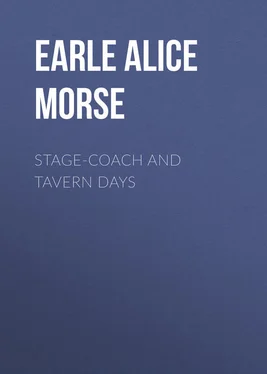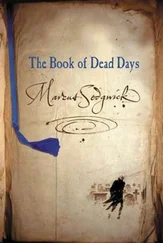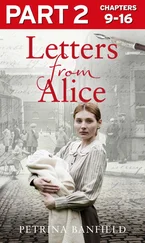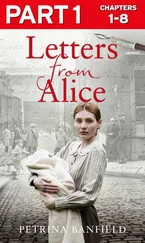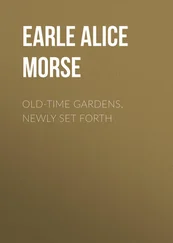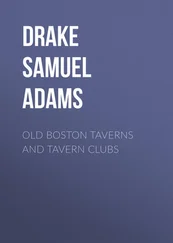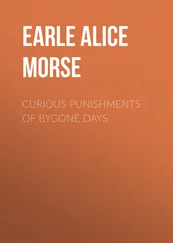Alice Earle - Stage-coach and Tavern Days
Здесь есть возможность читать онлайн «Alice Earle - Stage-coach and Tavern Days» — ознакомительный отрывок электронной книги совершенно бесплатно, а после прочтения отрывка купить полную версию. В некоторых случаях можно слушать аудио, скачать через торрент в формате fb2 и присутствует краткое содержание. Жанр: foreign_antique, foreign_prose, на английском языке. Описание произведения, (предисловие) а так же отзывы посетителей доступны на портале библиотеки ЛибКат.
- Название:Stage-coach and Tavern Days
- Автор:
- Жанр:
- Год:неизвестен
- ISBN:нет данных
- Рейтинг книги:4 / 5. Голосов: 1
-
Избранное:Добавить в избранное
- Отзывы:
-
Ваша оценка:
- 80
- 1
- 2
- 3
- 4
- 5
Stage-coach and Tavern Days: краткое содержание, описание и аннотация
Предлагаем к чтению аннотацию, описание, краткое содержание или предисловие (зависит от того, что написал сам автор книги «Stage-coach and Tavern Days»). Если вы не нашли необходимую информацию о книге — напишите в комментариях, мы постараемся отыскать её.
Stage-coach and Tavern Days — читать онлайн ознакомительный отрывок
Ниже представлен текст книги, разбитый по страницам. Система сохранения места последней прочитанной страницы, позволяет с удобством читать онлайн бесплатно книгу «Stage-coach and Tavern Days», без необходимости каждый раз заново искать на чём Вы остановились. Поставьте закладку, и сможете в любой момент перейти на страницу, на которой закончили чтение.
Интервал:
Закладка:
The night-watch went his rounds in many of our colonial towns, and called the hour and the weather. Stumbling along with his long staff and his dim horn-lantern, he formed no very formidable figure either to affright marauders or warn honest citizens that they tarried too long in the taproom. But his voice gave a certain sense of protection to all who chanced to wake in the night, a knowledge that a friend was near. All who dwelt in the old towns of Bethlehem and Nazareth in Pennsylvania could listen and be truly cheered by the sound of the beautiful verses written for the night watchman by Count Zinzendorf. In winter the watchman began his rounds at eight o’clock, in summer at nine. No scenes of brawling or tippling could have prevailed at the Rose Inn when these words of peace and piety rang out: —
Eight o’clock:
The clock is eight! To Bethlehem all is told,
How Noah and his seven were saved of old.
Nine o’clock:
Hear, Brethren, hear! The hour of nine is come;
Keep pure each heart and chasten every home.
Ten o’clock:
Hear, Brethren, hear! Now ten the hour-hand shows;
They only rest who long for night’s repose.
Eleven o’clock:
The clock’s eleven! And ye have heard it all,
How in that hour the mighty God did call.
Twelve o’clock:
It’s midnight now! And at that hour ye know
With lamps to meet the bridegroom we must go.
One o’clock:
The hour is one! Through darkness steals the day.
Shines in your hearts the morning star’s first ray?
Two o’clock:
The clock is two! Who comes to meet the day,
And to the Lord of Days his homage pay?
Three o’clock:
The clock is three! The three in one above
Let body, soul, and spirit truly love.
Four o’clock:
The clock is four! Where’er on earth are three,
The Lord has promised He the fourth will be.
Five o’clock:
The clock is five! While five away were sent,
Five other virgins to the marriage went.
Six o’clock:
The clock is six! And from the watch I’m free,
And every one may his own watchman be.
CHAPTER III
THE TAVERN LANDLORD
The landlord of colonial days may not have been the greatest man in town, but he was certainly the best-known, often the most popular, and ever the most picturesque and cheerful figure. Travellers did not fail to note him and his virtues in their accounts of their sojourns. In 1686 a gossiping London bookseller and author, named John Dunton, made a cheerful visit to Boston. He did not omit to pay tribute in his story of colonial life to colonial landlords. He thus pictures George Monk, the landlord of the Blue Anchor of Boston: —
“A person so remarkable that, had I not been acquainted with him, it would be a hard matter to make any New England man believe I had been in Boston; for there was no one house in all the town more noted, or where a man might meet with better accommodation. Besides, he was a brisk and jolly man, whose conversation was coveted by all his guests as the life and spirit of the company.”
This picture of an old-time publican seems more suited to English atmosphere than to the stern air of New England Puritanism.
Grave and respectable citizens were chosen to keep the early ordinaries and sell liquor. The first “house of intertainment” at Cambridge, Massachusetts, was kept by a deacon of the church, afterward Steward of Harvard College. The first license in that town to sell wine and strong water was to Nicholas Danforth, a selectman, and Representative to the General Court. In the Plymouth Colony Mr. William Collier and Mr. Constant Southworth, one of the honored Deputies, sold wine to their neighbors. These sober and discreet citizens were men of ample means, who took the duty of wine-selling to aid the colony rather than their own incomes.
The first ordinary in the town of Duxbury was kept by one Francis Sprague, said by a local chronicler to be of “ardent temperament.” His license was granted October 1, 1638, “to keep a victualling on Duxburrow side.” His ardent temperament shaped him into a somewhat gay reveller, and his license was withdrawn. It was regranted and again recalled in 1666. His son succeeded him, another jovial fellow. Duxbury folk were circumspect and sober, and desired innkeepers of cooler blood. Mr. Seabury, one of the tavern inspectors, was granted in 1678 “to sell liquors unto such sober-minded neighbours as hee shall thinke meet; soe as hee sell not lesse than the quantie of a gallon att a tyme to one pson, and not in smaller quantities by retaile to the occationing of drunkeness.”
The license to sell liquor and keep a tavern explained clearly the limitations placed on a tavern-keeper. The one given the Andover landlord in 1692 ran thus: —
“The Condition of this Obligation is sent. That Whereas the above said William Chandler is admitted and allowed by their Majesties’ Justices at a General Sessions of the Peace to keep a common Home of Entertainment and to use common selling of Ale, Beer, Syder, etc., till the General Session of Peace next, in the now-Dwelling house of said Chandler in Andover, commonly known by the sign of the Horse Shoe and no other, if therefore the said William Chandler, during the time of keeping a Publick House shall not permit, suffer, or have any playing at Dice, Cards, Tables, Quoits, Loggets, Bowls, Ninepins, Billiards, or any other unlawful Game or Games in his House, yard, Garden, or Backside, nor shall suffer to be or remain in his House any person or persons not being of his own family upon Saturday nights after it is Dark, nor any time on the Sabbath Day or Evening after the Sabbath, nor shall suffer any person to lodge or stay in his House above one Day or Night, but such whose Name and Surname he shall deliver to some one of the Selectmen or Constables or some one of the Officers of the Town, unless they be such as he very well knoweth, and will answer for his or their forthcoming: nor shall sell any Wine or Liquors to any Indians or Negroes nor suffer any apprentices or servants or any other persons to remain in his house tippling or drinking after nine of the Clock in the night time; nor buy or take to Pawn any stolen goods, nor willingly Harbor in his said House, Barn, Stable, or Otherwhere any Rogues, Vagabonds, Thieves, nor other notorious offenders whatsoever, nor shall suffer any person or persons to sell or utter any ale, beer, syder, etc., by Deputation or by colour of this License, and also keep the true assize and measure in his Pots, Bread and otherwise in uttering of ale, beer, syder, rum, wine, &c., and the same sell by sealed measure. And in his said house shall and do use and maintain good order and Rule: Then this present Obligation to be either void, or else to stand in full Force, Power, and Virtue.”
Dr. Dwight in his Travels said that Englishmen often laughed at the fact that inns in New England were kept by men of consequence. He says: —
“Our ancestors considered the inn a place where corruption might naturally arise and easily spread; also as a place where travellers must trust themselves, their horses, baggage, and money, and where women must not be subjected to disagreeable experiences. To provide for safety and comfort and against danger and mischief they took particular pains in their laws to prevent inns from being kept by unprincipled or worthless men. Every innkeeper in Connecticut must be recommended by the selectmen and civil authorities, constables and grand jurors of the town in which he resides, and then licensed at the discretion of the Court of Common Pleas. It was substantially the same in Massachusetts and New Hampshire.”
Читать дальшеИнтервал:
Закладка:
Похожие книги на «Stage-coach and Tavern Days»
Представляем Вашему вниманию похожие книги на «Stage-coach and Tavern Days» списком для выбора. Мы отобрали схожую по названию и смыслу литературу в надежде предоставить читателям больше вариантов отыскать новые, интересные, ещё непрочитанные произведения.
Обсуждение, отзывы о книге «Stage-coach and Tavern Days» и просто собственные мнения читателей. Оставьте ваши комментарии, напишите, что Вы думаете о произведении, его смысле или главных героях. Укажите что конкретно понравилось, а что нет, и почему Вы так считаете.
